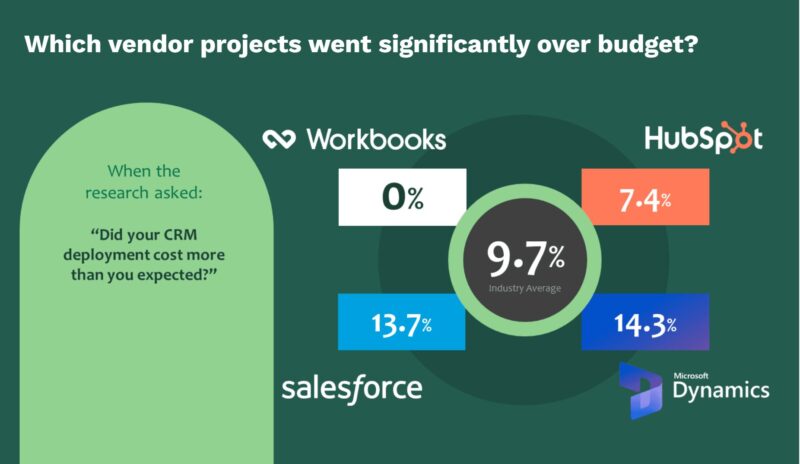Get a quick quote with our pricing calculator
4 ways enterprise CRM companies overcharge you
It’s frustrating to see how easily people can overpay when working with enterprise CRM vendors.
If you’ve already heard of a big brand and seen their advertising, it feels easier to trust them. But many tend to be laser-focused on hitting their quarterly numbers, sometimes at the expense of their customers.
Prices can reach huge figures each year for functionality that can be much cheaper if you shop around. And the costs don’t always stop there. Some enterprise CRM companies have found some cheeky ways to maximize their profits at your expense.
Let’s take a look at 4 ways they’re doing it:
- They make you jump through hoops for realistic pricing
Negotiating can be really tough when it comes to enterprise CRMs.
Have a browse online and you’ll see lots of suggested hacks to negotiate a more affordable CRM price when it comes to enterprise software. These include waiting for January discounts, renegotiating at year end, or cutting down on licences.
The general consensus online seems to be that if you’re not getting at least a 40% discount on the prices some enterprise CRMs share on their website, you’re getting a bad deal. And lots of customers really don’t know how that big discounts are available if they push hard enough.
But most people don’t want to or don’t realise they have to deal with a hard negotiation process. Afterall, the CRM company is meant to be a partner that’s helping you succeed.
Sure, enterprise companies can afford to be picky, and they probably offer discounts to certain customer ideals.
But back in the regular world, what’s important is integrity. And affordability.
There are low-cost CRMs out there that offer all the features you need. Check out our pricing calculator to work out how much you could be spending if you’re on a CRM budget.
2. They make pricing modules confusing on purpose
Have you tried the almost-impossible task of comparing CRM pricing? It’s complicated for a reason.
If you can’t compare pricing because it’s too complicated to break down, then you won’t figure out the true cost until you talk to a salesperson.
This is tactic that works well for some enterprise CRMs because you’re already engaging with them and investing your time. The more you commit your time, the more likely you are to follow it through.
If you’re trying to review CRM prices and finding it tough – consider it a red flag. There’s no reason the pricing should be hard to understand. Worst case, you should be able to easily work out a ballpark figure for the number of users you have against the functionality you need.
3. They increase your uplift percentage once your initial contract is up
Lots of people have shared their experiences online. The stories go something like this:
A company has a 5-year contract that is coming to an end.
They negotiate a new contract.
They’re told there’s a year-over-year uplift is being applied to all contracts.
Then you they get hit with a percentage change. So, if you had a 4% uplift over one year, the next year the enterprise company can decide to up it to 10%.
Unfortunately, these companies often rely on the stigma that switching CRM is a huge expensive task and hope to keep you because you believe the price increase is still less than moving.
But affordable CRM solutions provided by smaller companies can cost up to 70% less overall. And you won’t have the expectation of hidden costs. This means making the move can still save you a lot of money.
Take a look at our pricing calculator to work out how much you can save.
4. They use third parties for implementations which often leads to overspend
In our recent research comparing different kinds of CRM partner, we saw that 75% of those using a multi-party vendor said they incurred unexpected additional costs. Many enterprise CRM partners use third parties like consultants during the implementation. This means you have to talk to two separate companies during your implementation which can create more opportunity for errors.
By choosing a CRM partner that manages your implementation themselves, you can keep costs down and get a clearer line of communication.
Our latest customer survey highlighted Workbooks is the only CRM partner that delivered no significant additional costs during implementation.


What’s the difference between enterprise CRM partner and others?
Non-enterprise CRM partners have a completely different focus than enterprise ones.
As a smaller CRM provider ourselves, Workbooks is up to 70% cheaper than leading CRM enterprises. And there’s a very important difference between our approaches.
With Workbooks, we’re transparent.
We don’t create a bunch of confusing modules and try to hard sell a bunch of add-ons to you. Instead, we offer consultancy sessions to work out how we can provide real value.
Our pricing is clear, transparent and most importantly we have affordable CRM software. We don’t expect you to come into a negotiation with us ready to fight tooth and nail to get a good deal.
If you want to see a demo, it’s not gated or hidden. You don’t need to add your data. And unlike other CRM providers, we don’t ask you to meet with us before you see the product. It’s on our website ready to view.
We don’t pass off the implementation on a third-party who knows nothing about your business. We do it ourselves so that we can work with you each step of the way.
But we’re not always the first CRM people think of as we’re a smaller company that specializes in CRM for midsize business.
So, if you want to keep costs down and avoid overspending without compromising on functionality – check out smaller CRM companies in your review. You might be surprised at how much bang for your buck you can get.